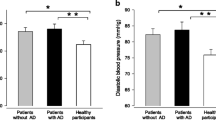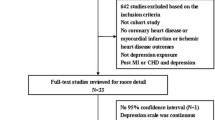Abstract
Background
Cholesterol and depression are both cardiac risk factors, but the direction and magnitude of the association between these risk factors is unclear.
Purpose
Meta-analytic techniques were used to evaluate the associations among total, high-, and low-density cholesterol (TC, HDL, LDL, respectively) and depression in empirical studies.
Methods
PubMed, CINAHL, PsycINFO, and manual search strategies were used to identify descriptive studies reporting associations among TC, HDL, LDL, and depression; 30 reports were found for TC, 16 for HDL, and 11 for LDL. Effect sizes were computed and aggregated in accord with Hedges and Olkin’s (Statistical methods for meta-analysis. New York: Academic Press; 1985) procedures.
Results
Higher TC was associated with lower levels of depression, d = −0.29; this association was substantially larger among medication-free samples (d = −0.51). An inverse, non-significant association was observed between LDL and depression (d = −0.17). High HDL was related to higher levels of depression, especially in women (d = 0.20).
Conclusions
TC and depression were inversely related, with the strongest associations in medically naïve samples, which is noteworthy because such samples should involve fewer confounds. One clinical implication is that the lipids of patients treated for depression should be monitored.


Similar content being viewed by others
References
Klag MJ, Ford DE, Mead LA, et al. Serum cholesterol in young men and subsequent cardiovascular disease. N Engl J Med. 1993; 328: 313–318.
Hunningdale DB, Stein EA, Dujivne CA, et al. The efficacy of intensive dietary therapy alone or combined with lovastatin in outpatients with hypercholesterolemia. N Engl J Med. 1993; 328: 1213–1219.
Tang JL, Armitage JM, Silagy CA, et al. Systematic review of dietary intervention trials to lower total cholesterol in free-living subjects. Br Med J. 1998; 316: 213–218.
Rozanski A, Blumenthal JA, Kaplan J. Impact of psychological factors on the pathogenesis of cardiovascular disease and implications for therapy. Circulation. 1999; 99: 2192–2217.
Wulsin L, Singal B. Do depressive symptoms increase the risk for the onset of coronary disease? A systematic quantitative review. Psychosom Med. 2003; 65: 201–210.
Suls J, Bunde J. Anger, anxiety, and depression as risk factors for cardiovascular disease: The problems and implications of overlapping affective dispositions. Psychol Bull. 2005; 131: 260–300.
Berkman LF, Blumenthal J, Burg M, et al. Effects of treating depression and low perceived social support on clinical events after myocardial infarction: The Enhancing Recovery in Coronary Heart Disease Patients (ENRICHD) Randomized Trial. J Am Med Assoc. 2003; 289: 3106–3116.
Glassman AH, O’Connor CM, Califf RM, et al. Sertraline treatment of major depression in patients with acute MI or unstable angina. J Am Med Assoc. 2002; 288: 701–709.
Davidson KW, Kupfer DJ, Bigger JT, et al. Assessment and treatment of depression in patients with cardiovascular disease: National Health, Lung and Blood Institute Working Group Report. Ann Behav Med. 2006; 32: 121–126.
Morgan RE, Palinkas LA, Barrett-Connor EL, et al. Plasma cholesterol and depressive symptoms in older men. Lancet. 1993; 341: 75–79.*
Olusi SO, Fido AA. Serum lipid concentrations in patients with major depressive disorder. Biol Psychiatry. 1996; 40: 1128–1131.*
Engelberg H. Low serum cholesterol and suicide. Lancet. 1992; 339: 727–729.
Terao T, Nakamura J, Yoshimura R, et al. Relationship between serum cholesterol levels and meta-chlorophenylpiperazine-induced cortisol responses in healthy men and women. Psychiatry Res. 2000; 96: 167–173.
Manfredini R, Caracciolom S, Salmi R, et al. The association of low serum cholesterol with depression and suicidal behaviors. J Int Med Res. 2000; 28: 245–257.
Grunfeld C, Feingold KR. Role of cytokines in inducing hyperlipidemia. Diabetes. 1992; 41Suppl. 2: 97–101.
Muldoon MF, Manuck SB, Matthews KA. Lowering cholesterol concentrations and mortality: A quantitative review of primary prevention trials. Br Med J. 1990; 301: 814–815.
Muldoon MF, Manuck SB, Mendelsohn AB, Kaplan JR, Belle SH. Cholesterol reduction and non-illness mortality: meta-analysis of randomized clinical trials. Br Med J. 2001; 322: 11–15.
Downs JR, Osler G, Santanello NC. HMG CoA reductase inhibitors and quality of life. J Am Med Assoc. 1993; 269: 3107–3108.
Law MR, Thompson SG, Wald NJ. Assessing possible hazards of reducing serum cholesterol. Br Med J. 1994; 308: 373–379.
Hedges LV, Olkin I. Statistical Methods for Meta-analysis. New York: Academic; 1985.
Borenstein M, Heges L, Higgins J, et al. Comprehensive Meta-analysis Version 2. Englewood: Biostat; 2005.
Rosenthal R. The “file drawer problem” and tolerance for null results. Psychol Bull. 1979; 86: 638–641.
Cockerill GW, Huehns TY, Weerasinghe A, et al. Elevation of plasma high-density lipoprotein concentration reduces interleukin-1-induced expression of E-selectin in an in vivo model of acute inflammation. Circulation. 2001; 103: 108–112.
Cowen PJ, Anderson IM, Fairburn CG. Neurochemical effects of dieting: Relevance to changes in eating and affective disorders. In: Anderson GH, Kennedy SH, eds. The Biology of Feast and Famine: Relevance to Eating Disorders (Vol. 10). San Diego: Academic; 1992: 269–284.
Plockinger B, Dantendorfer K, Ulm M, et al. Rapid decrease of serum cholesterol concentration and postpartum depression. Br J Med. 1996; 313: 664–666.
van Dam RM, Schuit AJ, Schouten EG, et al. Serum cholesterol decline and depression in the postpartum period. J Psychosom Res. 1999; 46: 385–390.
Hardy RJ, Thompson SG. Detecting and describing heterogeneity in meta-analysis. Stat Med. 1998; 17: 841–856.
Agargün MY, Algün E, Sekeroğlu R, et al. Low cholesterol level in patients with panic disorder: the association with major depression. J Affect Disord. 1998; 50: 29–32.*
Äijänseppä S, Kivinen P, Helkala EL, et al. Serum cholesterol and depressive symptoms in elderly Finnish men. Int J Geriatr Psychiatry. 2002; 17: 629–634.*
Apter A, Laufer N, Bar-Sever M, et al. Serum cholesterol, suicidal tendencies, impulsivity, aggression, and depression in adolescent psychiatric inpatients. Biol Psychiatry. 1999; 46: 532–541.*
Bajwa WK, Asnis GM, Sanderson WC, et al. High cholesterol levels in patients with panic disorder. Am J Psychiatry. 1992; 149: 376–378.*
Borgherini G, Dorz S, Conforti D, et al. Serum cholesterol and psychological distress in hospitalized depressed patients. Acta Psychiatr Scand. 2002; 105: 149–152.*
Brown SL, Salive ME, Harris TB, et al. Low cholesterol concentrations and severe depressive symptoms in elderly people. Br Med J. 1994; 308: 1328–1332.*
Chen CC, Lu FH, Wu JS, et al. Correlation between serum lipid concentrations and psychological distress. Psychiatr Res. 2001; 102: 153–162.*
Elovainio M, Keltikangas-Järvinen L, Pulkki-Råback L, et al. Depressive symptoms and C-reactive protein: the cardiovascular risk in young Finns study. Psychol Med. 2006; 36: 797–805.*
Ergün UGÖ, Uguz S, Bozdemir N, et al. The relationship between cholesterol levels and depression in the elderly. Int J Geriatr Psychiatry. 2004; 19: 291–296.*
Horsten M, Wamala S, Vingerhoets A, et al. Depressive symptoms, social support, and lipid profile in healthy middle-aged women. Psychosom Med. 1997; 59: 521–528.*
Huang TL, Chen JF. Lipid and lipoprotein levels in depressive disorders with melancholic feature or atypical feature and dysthymia. Psychiatr Clin Neurosci. 2004; 58: 295–299.*
Jow GM, Yang TT, Chen CL. Leptin and cholesterol levels are low in major depressive disorder, but high in schizophrenia. J Affect Disord. 2006; 90: 21–27.*
Karlović D, Buljan D, Martinac M, et al. Serum lipid concentrations in Croatian veterans with post-traumatic stress disorder, post-traumatic stress disorder comorbid with major depressive disorder, or major depressive disorder. J Korean Med Sci. 2004; 19: 431–436.*
Kim YK, Myint AM. Clinical application of low serum cholesterol as an indicator for suicide risk in major depression. J Affect Disord. 2004; 81: 161–166.*
Lindberg G, Larsson G, Setterlind S. Serum lipids and mood in working men and women in Sweden. J Epidemiol Community Health. 1994; 48: 360–363.*
Nakao M, Yano E. Relationship between major depression and high serum cholesterol in Japanese men. Tohoku J Exp Med. 2004; 204: 273–287.*
Nasta MT, Grussu P, Quatraro RM, et al. Cholesterol and mood states at 3 days after delivery. J Psychosom Res. 2002; 52: 61–63.*
Oxenkrug GF, Branconnier RJ, Harto-Truax N. Is serum cholesterol a biological marker for major depressive disorder? Clinical Trials, Guidelines, and Research Reports. 1983; 140: 920–921.*
Partonen T, Haukka J, Virtamo J, et al. Association of low serum total cholesterol with major depression and suicide. Br J Psychiatry. 1999; 175: 259–262.*
Pozzi F, Troisi A, Cerilli M. Serum cholesterol and impulsivity in a large sample of healthy young men. Psychiatry Res. 2003; 120: 239–245.*
Rabe-Jablonska J, Poprawska I. Levels of serum total cholesterol and LDL-cholesterol in patients with major depression in acute period and remission. Med Sci Monit. 2000; 6: 539–547.*
Roy A, Roy M. No relationship between serum cholesterol and suicidal ideation and depression in African-American diabetics. Arch Suicide Res. 2006; 10: 11–14.*
Rutledge T, Reis SE, Olson M, et al. Psychosocial variables are associated with atherosclerosis risk factors among women with chest pain: The WISE study. Psychosom Med. 2001; 63: 282–288.*
Sanyal D, Chakrabarti I, Basu J. Serum cholesterol as a marker in panic disorder: a pilot study. Int Med J. 2000; 7: 277–281.*
Sevincok L, Buyukozturk A, Dereboy F. Serum lipid concentrations in patients with comorbid generalized anxiety disorder and major depressive disorder. Can J Psychiatry. 2001; 46: 68–71.*
Shibata H, Kumagai S, Watanabe S, et al. Relationship of serum cholesterols and vitamin E to depressive status in the elderly. J Epidemiol. 1999; 9: 261–267.*
Suarez EC. Relations of trait depression and anxiety to low lipid and lipoprotein concentrations in healthy young adult women. Psychosom Med. 1999; 61: 273–279.*
Tiemeier H, van Tuijl HR, Hofman A, et al. Plasma fatty acid composition and depression are associated in the elderly: The Rotterdam study. Am J Clin Nutr. 2003; 78: 40–46.*
Troisi A, Moles A, Panepuccia L, et al. Serum cholesterol levels and mood symptoms in the postpartum period. Psychiatry Res. 2002; 109: 213–219.*
Troisi A, Scucchi S, San Martino L, et al. Age specificity of the relationship between serum cholesterol and mood in obese women. Physiol Behav. 2001; 72: 409–413.*
Acknowledgments
The research was supported partly by an AHA Predoctoral fellowship 071001Z grant to J-Y Shin, NIA grant AG024159 to J. Suls and NIH NR 009292 grant to R. Martin. The assistance of Matthew Bryant Howren is appreciated. Dr. Martin is in the Center for Research in the Implementation of Innovative Strategies in Practice (CRIISP) at the Iowa City VA Medical Center, which is funded through the Department of Veterans Affairs, Veterans Health Administration, Health Services Research, and Development Service. Dr. Martin is also in the College of Nursing at the University of Iowa. The views expressed in this article are those of the authors and do not necessarily represent the views of the Department of Veterans Affairs.
Author information
Authors and Affiliations
Corresponding author
About this article
Cite this article
Shin, J.Y., Suls, J. & Martin, R. Are Cholesterol and Depression Inversely Related? A Meta-analysis of the Association Between Two Cardiac Risk Factors. ann. behav. med. 36, 33–43 (2008). https://doi.org/10.1007/s12160-008-9045-8
Received:
Published:
Issue Date:
DOI: https://doi.org/10.1007/s12160-008-9045-8




